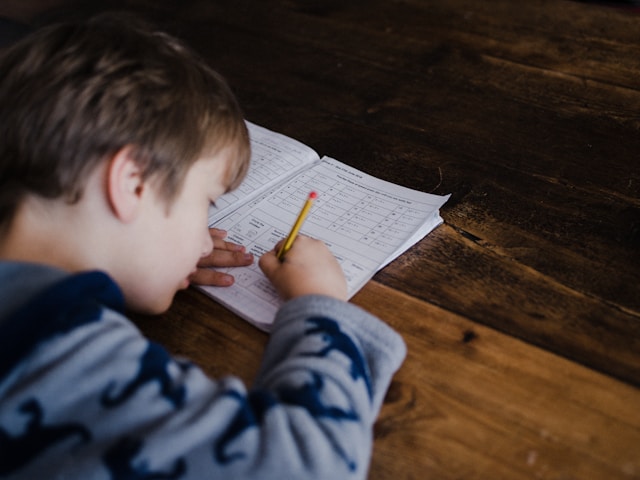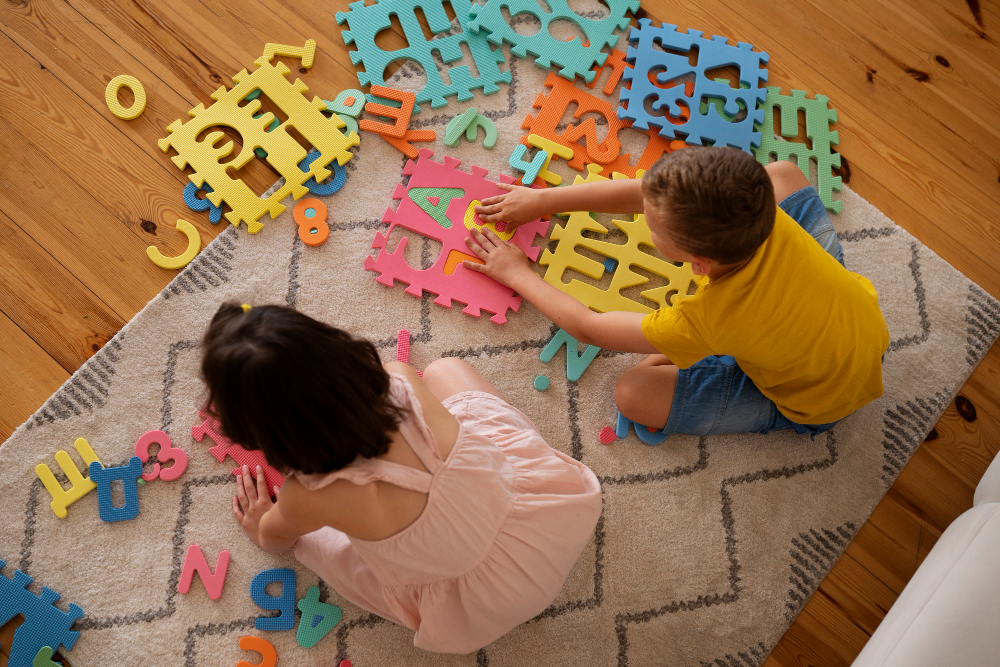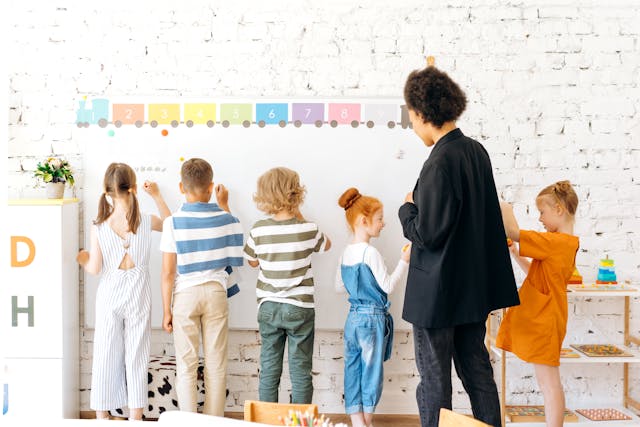30 Vocabulary Activities for Kids | Must Try

Vocabulary Building for kids is an essential component of language development and overall cognitive growth. It serves as the foundation for improved communication skills, reading comprehension, and academic performance. This blog will provide a thorough examination of vocabulary development, its significance for children, and effective vocabulary-enhancing practices. We intend to deliver this information in an informed and objective manner that is understandable to a general audience.
Understanding Vocabulary Building
Vocabulary building is the process of learning and acquiring new words and their meanings. This process starts early in life and lasts throughout a person's schooling and beyond. A large vocabulary enables people to express themselves more effectively, understand others better, and engage more fully in texts and discussions . Vocabulary building for kids is essential for their overall language development and academic success.

The Importance of Vocabulary Building for Kids
1 Enhanced Communication Skills:
Expressive Language: A large vocabulary helps children explain their thoughts and feelings more effectively.
Receptive Language: Understanding a diverse set of words improves listening and comprehension skills. Also read the Importance of Developing Communication skills.
2 Reading comprehension:
Vocabulary knowledge is intimately related to the capacity to comprehend and interpret text. Children with a large vocabulary understand the meaning of stories, instructions, and instructional materials more easily.
3 Academic Success:
A well-developed vocabulary promotes learning in all topics. It teaches children to follow directions, grasp inquiries, and convey their knowledge appropriately.
4 Cognitive Development:
Learning new words boosts cognitive skills like memory, problem solving, and critical thinking. It also promotes curiosity and a love of learning.
5 Social and Emotional Development:
Vocabulary skills are critical for successful social interactions. They empower children to establish friends, manage problems, and handle social situations with confidence. For more Social Emotional Learning read.
Vocabulary Building Activities for kids is fundamental to children's academic achievement, communication abilities, critical thinking skills, and overall personal growth.
When to Start Vocabulary Building with Kids?
Infancy (0-12 Months)
Key Focus: Listening and Early Sounds
Talk to Your Baby: Explain your activities, describe objects, and have one-sided conversations. Even while infants cannot react verbally, they are learning the sounds and rhythms of language.
Sing Songs and Rhymes: Singing lullabies and nursery rhymes introduces babies to the patterns of language and helps with auditory discrimination.
Toddlerhood (1-3 Years)
Key Focus: Word Acquisition and Simple Phrases
Expand Vocabulary: Introduce new words as you go about daily activities. Label objects and describe actions.
Simple Conversations: Engage in back-and-forth conversations, even if your child can only respond with single words or simple phrases. This practice encourages language use and builds confidence.
Preschool (3-5 Years)
Key Focus: Sentence Formation and Conceptual Understanding
Storytelling: Encourage your child to tell their own stories. This activity promotes creative thinking and vocabulary use.
Ask Open-Ended Questions: Help your youngster develop more complex sentences by asking questions that need more than a yes/no answer.
Early School Age (5-7 Years)
Key Focus: Reading and Writing
Independent Reading: Encourage your child to read books suited to their reading level. Discuss the stories and ask about the meanings of new words.
Writing Practice: Provide opportunities for your child to write. This could be through journaling, writing letters, or creating simple stories.

30 Activities to Build Your Kid's Vocabulary
Vocabulary Building Activities for Kids can be fun and engaging! Here are some activities you can try:
Synonym Matching:- Create a list of words and their synonyms, and have children match them. For Example:-
Happy - Joyful, Cheerful, Content, Delighted
Big - Large, Huge, Gigantic
Antonym Bingo:- Play Bingo using antonym pairs.
Happy - Sad , Big - Small , Fast - Slow , Hot - Cold.
Proverb Stories:- Encourage children to write short stories that incorporate and explain proverbs.
Simile Matching:- Match similes to their meanings or corresponding images.
Compound Word Creation:- Have children create new compound words and explain their meanings. For Example:-
Sunflower (Sun + Flower)
Toothbrush (Tooth + Brush)
Rainbow (Rain + Bow)
Butterfly (Butter + Fly)
Reading Aloud:- Regularly read books aloud to children to expose them to new words in context.
Word of the Day:- Introduce a new word each day and use it in sentences throughout the day.
Picture Books:- Use picture books to help children associate words with images.
Storytelling:- Encourage children to tell stories using new vocabulary words. You can also by reading short moral stories to your kid.
Flashcards:- Create flashcards with words and pictures to reinforce learning.
Labeling Objects:- Label household items with their names to help children learn everyday vocabulary.
Word Games:- Play word games like Scrabble, Boggle, or Pictionary.
Synonym Search:- Teach children to find synonyms for common words to expand their vocabulary.
Vocabulary Journals:- Have children keep a journal of new words they learn each week.
Word Walls:- Create a word wall where new vocabulary words are displayed and reviewed.
Rhyming Games:- Engage in rhyming games to help children learn word patterns and sounds.
Interactive Apps:- Use educational apps that focus on vocabulary building.
Word Puzzles:- Provide crosswords, word searches, and other word puzzles.
Contextual Learning:- Teach words in context, using sentences and stories to illustrate meaning.
Role-Playing:- Use role-playing activities to practice vocabulary in different scenarios.
Descriptive Writing:- Encourage children to write descriptive paragraphs or stories using new words.
Song Lyrics:- Learn and sing songs that have rich and varied vocabulary.
Charades:- Play charades with vocabulary words to help children understand meanings through actions.
Memory Games:- Use memory games with vocabulary flashcards to reinforce learning.
Word Families:- Teach word families (e.g., cat, bat, hat) to show how words are related.
Dictionary Use:- Teach children how to use a dictionary to find word meanings and usage.
Alphabet Games:- Play games that focus on finding words starting with each letter of the alphabet. To introduce Alphabets to your child read.
Field Trips:- Take field trips and introduce new vocabulary related to the places visited.
Science Experiments:- Conduct simple science experiments and learn vocabulary related to the activities.
Cooking Together:- Cook with children and teach them the names of ingredients and cooking terms.
Vocabulary Building for Kids is an essential component of a child's education and growth. It improves communication, reading comprehension, academic achievement, cognitive skills, and social connections. Reading aloud, interactive conversations, word games, visual aids, technology, and writing exercises are all useful ways that parents and educators can use to greatly increase their children's vocabulary. Investing time and effort in vocabulary development from a young age will equip children with the tools they need to excel academically and socially, laying the groundwork for lifelong learning. Vocabulary Building Activities for Kids not only enhance vocabulary but also foster a love for language and learning in children.




